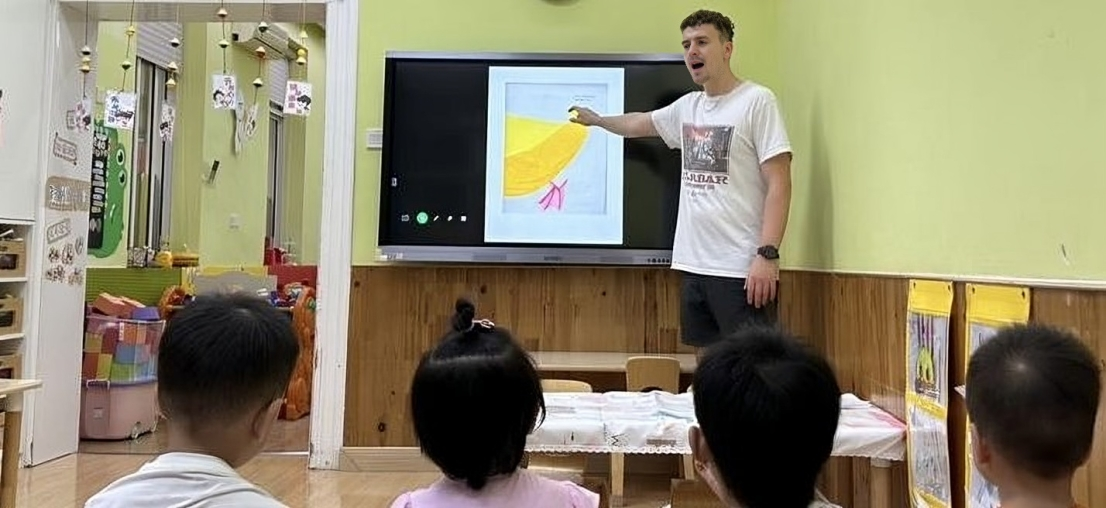By Josh Butterworth. Josh is Impact Teaching’s Social Media Manager, and he recently taught in China & Thailand.
This question always arises when we talk with candidates and is a completely valid concern. But consider this, we’ve helped over 2,000 teachers find jobs across the world since 2005, how many of them do you think were fluent in the local language of the country they were going to beforehand? I’ll tell you the answer, not many. Only a handful even know the basics prior to arrival, let alone possess the ability to communicate effectively. But how many of those teachers found great success and were brilliant at their jobs? The majority. Let me explain how this is possible and why YOU have what it takes to flourish as an ESL teacher abroad.
 The first possibility is that you’ll be teaching students whose level of English is good enough to communicate at a conversational level or higher. This is often the case in China, other than in kindergarten. Students either have the ability to speak English without difficulty or understand enough so that you have a base to work from and develop their skills further. If there are students in the class that don’t understand, it’s a good idea to use those that do to help you out in their own language. In each class there will be at least one ‘teacher’s pet’, look after them and they’ll look after you.
The first possibility is that you’ll be teaching students whose level of English is good enough to communicate at a conversational level or higher. This is often the case in China, other than in kindergarten. Students either have the ability to speak English without difficulty or understand enough so that you have a base to work from and develop their skills further. If there are students in the class that don’t understand, it’s a good idea to use those that do to help you out in their own language. In each class there will be at least one ‘teacher’s pet’, look after them and they’ll look after you.
As a foreign teacher, your main priorities are twofold. Your first task is to make English fun, appealing, and a subject that students want to learn. As a native speaker your second goal is to improve students pronunciation, this is something they often struggle with and cannot be helped by local teachers, despite their fluency. An ability to speak the local language may improve your chances of reaching these two targets, but they are by no means necessary. Your unique appeal for schools across the world is that you are interesting and exciting for the students to have in the classroom, and you have the skills needed to help them sound more like a native speaker.
But some students cannot speak or understand English at all. What then? Your answer comes in the form of a local co- teacher, your saving grace. You could face classes where only a few students understand the very basics of English, and if you’re lucky, the rest might just about be able to manage “hello”. But fear not, your local co-teacher will be by your side to translate instructions, help with classroom management and much more.
teacher, your saving grace. You could face classes where only a few students understand the very basics of English, and if you’re lucky, the rest might just about be able to manage “hello”. But fear not, your local co-teacher will be by your side to translate instructions, help with classroom management and much more.
Here at Impact Teaching we value transparency and always strive to tell the truth, and we would be lying if we said that every co-teacher is perfect and that they always turn up for class. Often, local teachers have far more work than foreign teachers but get paid significantly less. This might explain why they are not all completely motivated and see your class as a time to catch up on work or rest. However, the majority are fantastic. You are more likely to create a strong bond and working relationship with them rather than have issues.
 Putting a number on it, I would say over 75% of co-teachers are great and give you the support you need. But what if you’re left with one of the 25% and a class full of students who can’t understand a word of what you are saying? Well that’s when the fun begins. It’s likely, if this is the case, that the pressure on your back is going to be minimal. Schools expect you to do your best and have a good attitude, but they don’t expect miracles. Plenty of our teachers have been in this position before (me included) and survived, even thrived. Using body language, repetition, physical comedy, props, pictures and so on, it is possible to teach a class with no English as a teacher who only speaks English. In a nutshell, you’ll work it out. The training and ongoing support we offer will equip you with the specific skills and confidence you need.
Putting a number on it, I would say over 75% of co-teachers are great and give you the support you need. But what if you’re left with one of the 25% and a class full of students who can’t understand a word of what you are saying? Well that’s when the fun begins. It’s likely, if this is the case, that the pressure on your back is going to be minimal. Schools expect you to do your best and have a good attitude, but they don’t expect miracles. Plenty of our teachers have been in this position before (me included) and survived, even thrived. Using body language, repetition, physical comedy, props, pictures and so on, it is possible to teach a class with no English as a teacher who only speaks English. In a nutshell, you’ll work it out. The training and ongoing support we offer will equip you with the specific skills and confidence you need.
Whether you end up with a class of English wizards or students that look ever more confused with each word you say, you now know that there’s a solution to every problem. That may be a local co-teacher, a helpful student, or your charisma and patience. As long as you are always fair, kind, fun, caring, understanding, enthusiastic and keen to help students learn, you have what it takes to become a TEFL teacher abroad. But you only speak English? It’s no problem, let’s go.
We have programs in China, Thailand, Poland and Hungary. Check out our program pages and apply here to arrange a chat, we’ll discuss the right place for you and answer any questions you have. We can’t wait to help you get started on your journey to teaching abroad this year!




